Discover Humans On The Loop
Humans On The Loop

 Humans On The Loop
Humans On The Loop
Author: Michael Garfield
Subscribed: 853Played: 25,828Subscribe
Share
© Michael Garfield
Description
Let's dream better! Join paleontologist-futurist Michael Garfield for bold, far-ranging explorations into the nature of agency in the age of automation, wisdom and innovation, responsibility and power, and the care and feeding of the new superpowers conferred to us by magical technologies. Weekly dialogues at the edge of the knowable, learning to navigate Global Weirding and exponential AI with the curiosity and play required of us. Building on twenty years of independent research plus firsthand experience of the tech, arts, and science worlds, Humans On The Loop is a show to transform you and help us make better use of our greatest natural resource: our attention.
michaelgarfield.substack.com
michaelgarfield.substack.com
261 Episodes
Reverse
Membership | Donations | Spotify | YouTube | Apple Podcasts | Discord | FB GroupThis week (actually, April) I speak with Rimma Boshernitsan (Website | LinkedIn), a speaker, interviewer, facilitator, and advisor who has partnered with senior leadership at Fortune 500 companies—including Google, Kaiser Permanente, Roche, TATA, and Aesop—guiding them through transformation and growth. Her writing has appeared in Fast Company, Inc. Magazine, Tech Crunch and Forbes.She began her career in management consulting at Deloitte, focusing on M&A and large-scale transformation, before moving into industry advising across healthcare, consumer business, and telecommunications. Later work in the art world taught her how cultural and political insights could drive innovation and transformation in business, leading her to found DIALOGUE in 2016.She now combines strategic foresight, human-centered innovation, and interdisciplinary thinking to help her clients reframe challenges, identify opportunities, and lead with intention. She sits on the board of trustees at Headlands Center for the Arts and on the SECA Council Board at SFMOMA, and is also an advisor to Stanford’s Women in Design Program.Her most recent focus is in co-intelligence: integrating human, machine, and planetary intelligence to build future-facing organizations.I’m glad to have such an excellent partner in conversation to, as the Taoists say, “Feel our way across the river stone by stone” in a discussion about all of this and more: the re-emergence of nomadic populations and intentional communities, fumbling toward an idea of planetary culture, the role of intuition in leadership and biophilia in the design of our work spaces...it’s a marvelously nondisciplinary co-exploration.There are well over a dozen episodes in the editing queue and founding members can access the entire trove of unedited conversations before they’re released:✨ Show Links• Dig into nine years of mind-expanding conversations• Learn more about the Humans On The Loop project and its goals• Browse the books we discuss on the show at Bookshop.org• Contact me if you have a problem you think I can help you solve• Explore the interactive knowledge graph grown from over 250 episodes• Explore the Google Notebook for How To Live In The Future, my five-week science and philosophy course at Weirdosphere✨ Mentioned Media & PeopleIn Threads’ dwindling engagement, social media’s flawed hypothesis is laid bareIn a Time of Stress, Neuroaesthetic Spaces and Places Create a Path to Healing and HopeThe Triad of Intelligences: Harnessing Machine, Planetary, and Human Intuition in The Age of AIDIALOGUE Interviews: Ivy RossDIALOGUE Interviews: Susan MagsamenDIALOGUE Interviews: Kevin KellyMore Is Different: Broken symmetry and the nature of the hierarchical structure of scienceNikki SilvaBruce LiptonEd BernaysKen Wilber This is a public episode. If you'd like to discuss this with other subscribers or get access to bonus episodes, visit michaelgarfield.substack.com/subscribe
Membership | Donations | Spotify | YouTube | Apple PodcastsWhat the hell is going on with culture right now? The Web is running evolution in fast-forward, remixing the very substrates of identity and personhood in a molten broil of post-ironic, post-human, post-truth meme-play that reminds me of nothing more than the porous networked selfhood of bacterial in a molten wash of horizontal gene transfer. RIP the genre and all hail the hyper-real individual as institution, the self-fulfilling prophecies of [EDIT: Guy Debord’s] society of the spectacle [and Baudrillard’s simulation], the revenge of religion as our accelerating techno-social evolution prompts a kind of reversal as the movement of the Tao that challenges the dreams and ideals of the Enlightenment…it is a time of monsters, a rapid recombination of worlds and ways of living in them. How to make sense of it all…or is making sense even a viable strategy when rifts and ruptures are the name of the game?Amidst the chaos of pop culture and mainstream news, my friend Rina Nicolae of Incognita swims comfortably as a thoughtful commentator. Riffing philosophically on network society and its discontents, the emergent spiritual traditions of digital natives, and the posthuman bestiary of our AI- and biotech-saturated century, Rina’s Substack is a handbook to the cyborg aesthetic, the imagistic/algorithmic complex of online identity, our entanglement with capital and the possession by and performance of meme-space.How do we not become caricatures of ourselves in the world-creating and -destroying flood of remix culture? How do we cultivate roughness, fractality, wildness, illegigility? How do we stay, as Cadell Last put it in the previous episode, “in the gaps and cracks” instead of becoming prey to the new monsters of the unleashed imagination? How do we *befriend* those monsters?William Irwin Thompson said noise characterizes the emergence of planetary culture — an age in which “Technology slays the victim” of the mind “resurrects it as art” in a new ecology of consciousness. If, then, the only way through is up and out, then join me as, once more, we dive into the noise and make music together with Rina…Links• Hire me for speaking or consulting• Explore the Humans On The Loop archives• Dig into nine years of mind-expanding podcasts• Browse the books we discuss on the show at Bookshop.org• Explore the interactive knowledge garden grown from over 250 episodes• Join the Wisdom x Technology (open) & Future Fossils (legacy) Discord serversDiscussedProphets Of A Machine FutureWhat Is Posthumanism?The New MonstrousMilady Infiltrates The VaticanKim Kardashan Was Never HumanThe AI That Can Change Your MindMentionedPriya RoseDonna HarawayBobby AzarianDavid DeutschJack HalberstamJulia ChristevaTimothy MortonK. Allado-McDowellMary ShelleyBenjamin BrattonCharlotte FangMarshall McLuhanJimi HendrixTaryn SouthernJim O’ShaughnessyKevin Kelly This is a public episode. If you'd like to discuss this with other subscribers or get access to bonus episodes, visit michaelgarfield.substack.com/subscribe
Membership | Donations | Spotify | YouTube | Apple Podcasts✨ About This EpisodeThis week I talk to Sam Arbesman, scientist-in-residence at Lux Capital, Research Fellow at the Long Now Foundation, and host of The Orthogonal Bet, weaving together and plucking at the ideas in his delightful new book, The Magic of Code: How Digital Language Created and Connected Our World…and Shapes Our Future. Sam is a brilliant scholar, a maverick mind, and a good friend—so even though we don’t see perfectly eye-to-eye about just where the analogy of code as magic works and where it falls apart, that tiny bit of friction makes for a fascinating joint exploration into the liminal zones where our categories fray and their distinctions are constantly rewritten.In this episode, we discuss:• Sam’s origin story as a code-lover (00:10:20)• Code as “algebra and fire” (00:14:17)• If code is magic, what is magic? (00:20:10)• Open-source development and open-ended innovation (00:25:48)• Rethinking the nature of “failure” in the so-called Technocene (00:32:12)• Navigating simplicity and complexity (00:38:44)• Acceptable and unacceptable sacrifices to the incomprehensibility of our technologies (00:45:02)• The squishy overlap between tech and biology (00:54:03)• The co-domestication of software bugs and people (01:03:22)• And the emerging age of ephemerality (01:15:55)It was, as it always is with Sam, a joy. I hope you get as much out of it as we did.This Saturday at 10 am PDT is the return of our monthly members hangouts. Join us!✨ Show Links• Dig into nine years of mind-expanding conversations• Learn more about the Humans On The Loop project and its goals• Browse the books we discuss on the show at Bookshop.org• Contact me if you have a problem you think I can help you solve• Explore the interactive knowledge graph grown from over 250 episodes• Explore the Google Notebook for How To Live In The Future, my five-week science and philosophy course at Weirdosphere✨ Mentioned Reading & PeopleSteven Johnson - Everything Bad Is Good For YouWilliam Alonso - “Predicting Best with Imperfect Data”Danny Hillis - “The Enlightenment Is Dead, Long Live The Entanglement”Moses Maimonides - The Guide To The PerplexedRichard Brautigan - “All Watched Over by Machines of Loving Grace”Stewart Brand - The Clock of The Long NowLawrence Lundy-BryanClive ThompsonKevin KellyJose Luis BorgesLionel Snell (Ramsey Dukes)Nadia AsparouhovaUrsula K LeGuinWilliam GibsonDavid KrakauerMichael LevinChris LangtonJim LovelockLynn MargulisAlan MooreJessica FlackMonica AndersonJeremy UtleyAlan PerlisSteve Jobs✨ Mentioned Episodes This is a public episode. If you'd like to discuss this with other subscribers or get access to bonus episodes, visit michaelgarfield.substack.com/subscribe
Membership | Donations | Spotify | YouTube | Apple PodcastsThis week we hear from Larry Muhlstein, who worked on Responsible AI at Google and DeepMind before leaving to found the Holistic Technology Project. In Larry’s words:“Care is crafted from understanding, respect, and will. Once care is deep enough and in a generative reciprocal relationship, it gives rise to self-expanding love. My work focuses on creating such systems of care by constructing a holistic sociotechnical tree with roots of philosophical orientation, a trunk of theoretical structure, and technological leaves and fruit that offer nourishment and support to all parts of our world. I believe that we can grow love through technologies of togetherness that help us to understand, respect, and care for each other. I am committed to supporting the responsible development of such technologies so that we can move through these trying times towards a world where we are all well together.”In this episode, Larry and I explore the “roots of philosophical orientation” and “trunk of theoretical structure” as he lays them out in his Technological Love knowledge garden, asking how technologies for reality, perspectives, and karma can help us grow a world in love. What is just enough abstraction? When is autonomy desirable and when is it a false god? What do property and selfhood look like in a future where the ground truths of our interbeing shape design and governance?It’s a long, deep conversation on fundamentals we need to reckon with if we are to live in futures we actually want. I hope you enjoy it as much as we did.Our next dialogue is with Sam Arbesman, resident researcher at Lux Capital and author of The Magic of Code. We’ll interrogate the distinctions between software and spellcraft, explore the unique blessings and challenges of a world defined by advanced computing, and probe the good, bad, and ugly of futures that move at the speed of thought…✨ Show Links• Hire me for speaking or consulting• Explore the interactive knowledge garden grown from over 250 episodes• Explore the Humans On The Loop dialogue and essay archives• Browse the books we discuss on the show at Bookshop.org• Dig into nine years of mind-expanding podcasts✨ Additional Resources“Growing A World In Love” — Larry Muhlstein at Hurry Up, We’re Dreaming“The Future Is Both True & False” — Michael Garfield on Medium“Sacred Data” — Michael Garfield at Hurry Up, We’re Dreaming“The Right To Destroy” — Lior Strahilevitz at Chicago Unbound“Decentralized Society: Finding Web3’s Soul” — Puja Ohlhaver, E. Glen Weyl, and Vitalik Buterin at SSRN✨ MentionsKarl Schroeder’s “Degrees of Freedom”Joshua DiCaglio’s Scale TheoryGeoffrey West’s ScaleHannah ArendtKen WilberDoug Rushkoff’s Survival of the RichestManda Scott’s Any Human Power Torey HaydenChaim Gingold’s Building SimCityJames P. Carse’s Finite & Infinite GamesJohn C. Wright’s The Golden OecumeneEckhart Tolle’s The Power of Now✨ Related Episodes This is a public episode. If you'd like to discuss this with other subscribers or get access to bonus episodes, visit michaelgarfield.substack.com/subscribe
Membership | Donations | Spotify | YouTube | Apple PodcastsToday’s guest Taryn Southern is someone I consider a master surfer of technological change: a fellow elder millennial, artist, creative technologist, strategist, and dancer in the liminal zones of high chop. She’s better than I am at finding the pocket, has made a name for herself for riding some serious bombs, and seems to know precisely when to bail. Starting as an actor, Internet famous for being an early YouTube influencer and her album I Am AI, the first LP composed and produced with an LLM, she caught air at the Tribeca Film Festival in 2019 with the premier of her documentary I Am Human (co-directed with Elena Gaby), an intimate look at the lives of three people with implantable brain interfaces and the medical, ethical and societal implications.She’s also produced an award-winning musical VR series for Google using Tiltbrush and Blocks, worked as Chief Storyteller for Blackrock Neurotech, minted the first song token on the Ethereum blockchain, spoken and consulted all over the world, operated as an angel investor, and survived breast cancer. In other words, she’s just the person to teach you how to hang ten instead of duck diving under the next pounder. Let’s drop in and grab the rail. Thanks for listening!If you enjoy this conversation, join the Wisdom x Technology Discord server and consider becoming a member for access to the complete archives, study groups, and community calls.Founding members also get access to the entire twenty hours of lecture and discussion from my recent course, How to Live in the Future at Weirdosphere.Show Links• Explore the interactive knowledge garden grown from over 250 episodes• Dig into nine years of mind-expanding podcasts• Explore the Humans On The Loop dialogue and essay archives• Browse the books we discuss on the show at Bookshop.org• Hire me for speaking or consultingChapters00:00 Introduction: The Promise and Perils of Technology 01:07 Welcome to Humans On the Loop 05:57 Taryn's Early Fascination with Technology 08:55 Living with Constraints and The Spirit of Exploration 31:06 AI in Personal Growth and Communication 38:52 AI as a New Religion and Therapy Tool 42:04 The Ethical Dilemmas of AI and Big Tech 47:58 The Future of AI in Governance and Society 57:42 Empowering Individuals with AI and Community InvolvementMentionsMoon RibasRolf Potts’ VagabondingDamien Walter’s “Modernity is Done”Jim O’ShaughnessySolo: A Star Wars StoryMichael Davis on Exploring the Intersection of AI & RomanceThe Evolution of SurveillanceCory Doctorow’s “enshittification”Howard Rheingold This is a public episode. If you'd like to discuss this with other subscribers or get access to bonus episodes, visit michaelgarfield.substack.com/subscribe
Membership | Donations | Spotify | YouTube | Apple PodcastsWe live in simulated worlds of our own making, detecting patterns in the chaos and complexity of raw experience and boiling them down into operable categories and generalizations. Sometimes we do this well, and sometimes…This week’s guest, computer scientist and game designer Chaim Gingold, wrote what I consider the best book available on the history and sociality of simulations: Building SimCity: How to Put the World in a Machine (MIT Press) takes readers from the prehistory of modern computing through the post-war development of cybernetics and systems thinking and into the entangled relationship of video games, military info-tech, civil engineering, software-based education, and complexity science that forms today’s “invisible environment.” Sim City is more than a legendary video game. It is case study in how the digital revolution reshaped the ways we think, teach, design, and govern…and how what simulation as a mode of discourse can hide and reveal, oppress and empower us. In this dialogue we explore the the tensions between games and play, the analog and digital, abstraction and tactility, and mysticism and colonialism in simulation-induced experiences. We investigate the rise and fall of Sim City game developer MAXIS, weave threads through the history of computing and software development, systems science, and the philosophy of technology, and ask:What makes some abstractions better than others?If you enjoy this conversation, join the Wisdom x Technology Discord server and consider becoming a member for access to the complete archives, study groups, and community calls.Founding members also get access to the entire twenty hours of lecture and discussion from my recent course, How to Live in the Future at Weirdosphere.Show Links• Explore the interactive knowledge garden grown from over 250 episodes• Dig into nine years of mind-expanding podcasts• Explore the Humans On The Loop dialogue and essay archives• Browse the books we discuss on the show at Bookshop.org• Hire me for speaking or consultingMentionsWill WrightJohn Conway’s Game of LifeVannevar BushAlan Kay & Xerox PARCEd Catmull - Creativity, Inc.James Clerk MaxwellEthan MollickBrian Sutton-SmithGottfried LiebnizLarry OwensJay ForresterLauren F. KleinEdgar MitchellRusty SchweickertJulian of NorwichChris LangtonKen ForbisMark ZuckerbergElon MuskSam AltmanSam Arbesman - The Magic of CodeTimothy MortonDonna HarawayNick BostromJoshua DiCaglio - Scale TheoryStanislaw Lem - The CyberiadKevin Kelly - Out of ControlStewart Brand & The Whole Earth CatalogFred Turner - From Counterculture to CybercultureDe Kai - Raising AIAnd in case you missed it: This is a public episode. If you'd like to discuss this with other subscribers or get access to bonus episodes, visit michaelgarfield.substack.com/subscribe
Membership | Donations | Spotify | YouTube | Apple PodcastsThis week I speak with Rufus Pollock (Website | Twitter | Wikipedia), former Mead Fellow in Economics at the University of Cambridge, entrepreneur, activist, author of Open Revolution and Wiser Societies, RSA Fellow, and co-founder of Life Itself, Open Knowledge Foundation, Datopian, and Second Renaissance. Rufus is a key player in the so-called “Liminal Web” and active mapper of the ecosystem of emerging changemaking organizations who, along with his wife Sylvie Barbier and an extensive network of brilliant allies, strives to promote the shifts in consciousness and culture that we need to safely navigate our age of accelerating technology with wiser, weller ways of living together.Together we get into the good, bad, and ugly of our nascent planetary culture — the tension between ecological consciousness and economic force, the demands placed on us to reclaim time-tested strategies for community and meaning in a brave new world, the intertwingling of religion and science, and why technological solutions alone are woefully inadequate (however necessary) as we face our crises of collective action. It’s an earnest, soul-searching, thoughtful, and far-reaching extra-long conversation and I hope that you find as much value in it as we did.If you enjoy this conversation, join the Wisdom x Technology Discord server and consider becoming a member for access to our study groups, community calls, and complete archives.Founding members also get access to the entire twenty hours of lecture and discussion from my recent course, How to Live in the Future at Weirdosphere.Show Links• Explore the interactive knowledge garden grown from over 250 episodes• Dig into nine years of mind-expanding podcasts• Explore the Humans On The Loop archives• Browse the books we discuss on the show at Bookshop.org• Hire me for speaking or consultingDiscussedFour Types of ProblemSecond Renaissance Whitepaper & Theory of ChangeTechnology as GodGetting over our Allergy to ReligionThe Primacy of BeingDavid Sloan Wilson - Darwin’s CathedralWilliam Irwin Thompson - Imaginary Landscape, The Digital Economy of W. Brian ArthurFederico Campagna - Prophetic CultureAlex Shakar - LuminariumArthur C. Clarke & Stephen Baxter - The Light of Other DaysJoe Henrich - The WEIRDest People in the WorldJessica Flack - Coarse-Graining as a Downward Causation MechanismMentionedBayo AkomolafeSylvie BarbierLiam KavanaughBret Easton EllisJohn StewartCarl JungDoug RushloffKarl MarxGoetheJamie WhealSteven KotlerKen WilberRobert KeganSuzanne Cook-GreuterPaul LevyGeorge W. BushUrsula K. LeGuinIain McGilchristJim O’ShaughnessyNaval RavikantThich Nhat HanhW. Brian ArthurHazel HendersonJim RuttChristopher AlexanderJamie CurcioJordan PetersonW. B. Yeats This is a public episode. If you'd like to discuss this with other subscribers or get access to bonus episodes, visit michaelgarfield.substack.com/subscribe
Membership | Donations | Spotify | YouTube | Apple PodcastsThis week we speak with George Pór, mentee of Doug Englebart, Founder of Future HOW, Enlivening Edge, and Campus Co-Evolve, independent scholar with past academic posts at the London School of Economics, INSEAD, UC Berkeley, California Institute of Integral Studies, and Université de Paris, wisdom-guided AI advisor at River, and consultant who has worked with clients including the UN Development Programme, HP, Greenpeace, Intel, Ford, and the World Wildlife Foundation. George has played vital roles our emerging understanding of collective intelligence, knowledge gardening, and online community. In this episode we explore his latest iteration as a Metamodern AI Shaman — what that means, why he’s promoting this approach for the cultivation of hybrid human-machine wisdom, and his theory of change for a reimagined human being in an age of collaborative planet-scale intelligence.Links• Hire me for speaking or consulting• Explore the Humans On The Loop archives• Dig into nine years of mind-expanding podcasts• Browse the books we discuss on the show at Bookshop.org• Explore the interactive knowledge garden grown from over 250 episodesDiscussedExtensive context and background summary provided by George hereRadio evolve #568 - Collective Wisdom and ChatGPT with George PórPrelude to the Rise of the Compassionate AI - George PórAI and Wisdom - George PórA Future of our Interactions with AI - George PórNobel Prize in economics awarded to trio for explaining why some nations are rich and others poor (CNN)Scaling of urban income inequality in the USA - Elisa Heinrich Mora, Cate Heine, Jacob J. Jackson, Geoffrey B. West, Vicky Chuqiao Yang, and Christopher P. KempesAI Attending Human Attending AIRelationality - David JaySeeing Like A State - James C. ScottMentioned People & EpisodesLayman PascalFrederic LalouxTimothy MortonAri KushnerStephanie LeppDavid SauvageRoss DawsonStephen ReidTurquoise SoundKate RaworthMatt SegallFrancisco Varela This is a public episode. If you'd like to discuss this with other subscribers or get access to bonus episodes, visit michaelgarfield.substack.com/subscribe
Membership | Donations | Spotify | YouTube | Apple PodcastsThis week’s guest is my friend Evan Miyazono, CEO and Director of Atlas Computing — a tech non-profit committed not to the false god of perfect alignment but to plausible strategy of provable safety. Focusing on community building, cybersecurity, and biosecurity, Evan and his colleagues are working to advance a new AI architecture that constrains and formally specifies AI outputs, with reviewable intermediary results, collaborating across sectors to promote this radically different and more empirical approach to applied machine intelligence.After completing his PhD in Applied Physics at Caltech, Evan led research at Protocol Labs, creating their research grants program, and led the special projects team that created Hypercerts, Funding the Commons, gov4git, and key parts of Discourse Graphs and the initial Open Agency Architecture proposal.In our conversation we talk about a wide swath of topics including regulatory scaling problems, specifying formal organizational charters, the spectre of opacity, and the quantification of trust — all, in some sense, interdisciplinary matters of “game design” in our entanglement with magical technologies and fundamental uncertainty.If you enjoy this conversation, join the Wisdom x Technology Discord server and consider becoming a member for access to our study groups, community calls, and complete archives. Founding members also get access to the entire twenty hours of lecture and discussion from my recent course, How to Live in the Future.Links• Hire me for speaking or consulting• Explore the Humans On The Loop archives• Dig into nine years of mind-expanding podcasts• Browse the books we discuss on the show at Bookshop.org• Explore the interactive knowledge garden grown from over 250 episodesDiscussed• Atlas Computing Summary Slides• Atlas Computing Institute Talks (YouTube Playlist)• A Toolchain for AI-Assisted Code Specification, Synthesis and Verification• Also, a relevant paper from Max Tegmark:Provably safe systems: the only path to controllable AGIMentionedGregory BatesonDavid DalrympleK. Allado-McDowellTerence McKennaYuval Noah HarariCosma ShaliziHenry FarrellHakim BeyNatalie DeprazFrancisco VarelaPierre VermerschPlurality InstitutePuja OhlhaverSean Esbjörn-HargensAlfred North WhiteheadDe KaiPrimer RiffAre we doing AI alignment wrong? Game designers Forrest Imel and Gavin Valentine define games as having meaningful decisions, uncertain outcomes, and measurable feedback. If any one of these breaks, the game breaks. And we can think about tech ethics through this lens as well. Much of tech discourse is about how one or more of these dimensions has broken the “game” of life on Earth — the removal of meaningful decisions, the mathematical guarantee of self-termination through unsustainable practices, and/or the decoupling of feedback loops.AI alignment approaches tend to converge on restoring meaningful decisions by getting rid of uncertainty, but it’s a lost cause. It’s futile to encode our values into systems we can’t understand. To the extent that machines think, they think very differently than we do, and characteristically “interpret” our requests in ways that reveal the assumptions we are used to making based on shared context and understanding with other people.We may not know how a black box AI model arrives at its outputs, but we can evaluate those outputs…and we can segment processes like this so that there are more points at which to review them. One of this show’s major premises is that the design and use of AI systems is something like spellcraft — a domain where precision matters because the smallest deviation from a precise encoding of intent can backfire.Magic isn’t science in as much as we can say that for spellcraft, mechanistic understanding is, frankly, beside the point. Whatever you may think of it, spellcraft evolved as a practical approach for operating in a mysterious cosmos. Westernized Modernity dismisses magic because Enlightenment era thinking is predicated on the knowability of nature and the conceit that everything can and will eventually bend to principled, rigorous investigation. But this confused accounting just reshuffled its uneradicable remainder of fundamental uncertainty back into a stubbornly persistent Real that continues to exist in excess of language, mathematics, and mechanistic frameworks. Economies, AI, and living systems guarantee uncertain outcomes — and in accepting this, we have to re-engage with magic in the form of our machines. The more alike they become, the more our mystery and open-ended co-improvisation loom back over any goals of final knowledge and control.In a 2016 essay, Danny Hillis called this The Age of Entanglement. It is a time that calls for an evolutionary approach to technology. Tinkering and re-evaluating, we find ourselves one turn up the helix in which quantitative precision helps us reckon with the new built wilderness of technology. When we cannot fully explain the inner workings of large language models, we have to step back and ask:What are our values, and how do we translate them into measurable outputs?How can we break down the wicked problem of AI controllability into chunks on which it’s possible to operate?How can adaptive oversight and steering fit with existing governance processes?In other words, how can we properly task the humanities with helping us identify “meaningful decisions” and the sciences with providing “measurable feedback.” Giving science the job of solving uncertainty or defining our values ensures we’ll get as close as we can to certitude about outcomes we definitely don’t want. But if we think like game designers, then interdisciplinary collaboration can help us safely handle the immense power we’ve created and keep the game going. This is a public episode. If you'd like to discuss this with other subscribers or get access to bonus episodes, visit michaelgarfield.substack.com/subscribe
This week’s guest is Cadell Last, the creator of Philosophy Portal, author of Global Brain Singularity and Real Speculations, and organizer of myriad conferences, anthologies, and collaborative volumes exploring biocultural evolution, the mind-matter relation, and speculative futures. Cadell has been the director of psychedelic research at Psirenity, a researcher at the Bertalanffy Center for the Study of Systems Science, a science writer on primatology and paleoanthropology for Scientific American, and the founder, writer, and researcher for The Advanced Apes at PBS Digital Studios.In this episode, we discuss self-actualization and self-transformation in our age of magical technologies — the domestication of the human being by AI and institutions, how to live in a future of hyper-social neuroplasticity, navigating hybrid physical-virtual relationships, the importance of intergenerational learning, and how we can make a better argument for culture to the social systems that only perceive measurable value. In the climax of this conversation, Cadell makes a case for “staying with the lack” and “working the cracks in being” as ways of cultivating our agency in a highly-automated world.Become a member to join our hangouts, salons, and study groups:Project Links• Explore this project’s essay and episode archives• Make tax-deductible donations (recurring pledges grant membership)• Join the Wisdom x Technology & Future Fossils Discord servers• Browse the books we discuss on the show• Explore the interactive model grown from over 250 episodes• Book me for speaking or consultingCadell’s LinksWebsite (with research and social media links)Philosophy PortalYouTube(+ My recent appearance as a guest on Cadell’s Philosophy Portal show)Relevant PapersHuman Evolution: Life History Theory and the End of Biological ReproductionSelf Actualization in the CommonsGlobal Commons in the Global BrainGlobal Brain and the Future of Human SocietyInformation-Energy Metasystem ModelAbstraction, mimesis and the evolution of deep learningLandian Exit and Hegelian LoveSystems & Subjects: Thinking the Foundations of Science & PhilosophyLogic for the Global Brain: Singular Universality as Perfect OppositionMentionsKevin KellyLawrence SteinbergNick LandNora BatesonJessica FlackThomas PicketyMichel BauwensLayman PascalDavid JayPhilip K. DickYanis VaroufakisChris CutroneAndrew TateBenjamin StudebakerGordon BranderAlan TuringKate RaworthRelated Episodes This is a public episode. If you'd like to discuss this with other subscribers or get access to bonus episodes, visit michaelgarfield.substack.com/subscribe
This week’s guest is the singular Michael Dean, who graduated from architecture school and played in a band before spending years in tech working on virtual reality, only to metamorphose into one of the best essayists I’ve ever read. With support from Humans On The Loop supporters O’Shaughnessy Ventures and Cosmos Institute, Dean is now decoding the structure of great essays and translating his framework into both a textbook and an AI-powered editing tool.In this conversation, we explore how to cultivate human agency at the frontiers where physical reality and the metaverse fold into one another and entangled human and machine intelligences unleash radical new possibilities for reflection and creativity. By the end of our discussion we start to trace the contours of a world in which everyone has a better chance to pursue their passions without having to worry about “product-market fit” — a future in culture stages a glorious insurrection against the dehumanizing division between passion and paid work.If this episode stimulates or triggers you, please leave a comment here or on YouTube — I would love to learn from you and this project exists as a space for thoughtful discourse!Upcoming Events* 3 May @ 11 am Mountain– Book Club: Prophetic Culture by Federico Campagna(patrons-only discussion)* 13 May-14 June – How To Live In The Future at Weirdosphere(five-week online course with ten sessions)Project Links• Explore this project’s essay and episode archives• Join the Discord server• Browse the books we discuss on the show• Explore the conversational mind-map grown from nine years of conversations• Book me for speaking or consultingDean’s LinksThe Secret Architecture of Great EssaysTeleportation, $97/month, coming soonLas Vegas & the MetaverseA change of heartPrepping for the Editor G*dsMega-updateSungazerLucy in the Sky of Large Language Models4 Types of Material in Every EssayMentioned Books & ArticlesMichael Garfield – Sacred DataJohn Smart – The transcenscion hypothesisJ.C.R. Licklider & Bob Taylor – The Computer as a Communication DeviceKevin Kelly – AR Will Spark The Next Big Tech Platform — Call It MirrorworldDouglas Rushkoff – Present ShockYoshija Walter – Artificial influencers and the dead internet theoryMentioned People & PodcastsJ.F. MartelK. Allado McDowellDanielle BassettTyson YunkaportaMitch MignanoJaron LanierPeter DiamandisWilliam Irwin ThompsonBenjamin OlsenThe BeatlesTerence McKennaGrimesHolly HerndonTimothy LearyJake KobrinSara PhinnThe Ungoogleable MichaelangeloErik HoelMichael Crichton This is a public episode. If you'd like to discuss this with other subscribers or get access to bonus episodes, visit michaelgarfield.substack.com/subscribe
“When I have a rich, powerful, mind expanding, mind bending conversation like this, I'll need to go and lie down in darkened room afterwards.”– Robert PoyntonThis week’s guest is my friend and inspiration Robert Poynton, Founder of Yellow Learning, Associate Fellow at the Saïd Business School at Oxford, and author of three beautiful short books — Do Pause, Do Improvise, and Do Conversation — full of his insights from decades of designing and leading Executive Education leadership programs and hosting creative retreats in Spain.In Future Fossils Episode 196 Robert and I discussed how important it is to learn the principles of improvisation as a way of life. And as he notes in his latest book, most of us are already skilled improvisers because we spend our lives in conversation — not just with each other, but with our environments. How does trying on this frame transform the ways that we relate to them?In this episode we explore conversations as an art form and as a technology, technology as a conversation, and how weird this all gets when so many of us are having what feel like literal conversations with technology itself. Some of our topics:• How do we create fertile “conversational fields”? • How do different media constrain and open conversational possibilities?• What does it mean to “be generous” with our improv partners?• What might the structure of good conversation teach us about engaging with AI — and help us “converse” with the entire history of a person or a culture?At the heart of this project and this episode in particular is the belief that some things are worth doing not because they get us where we want to go, but because they’re pleasures in themselves. Good conversations are their own reward, and conversations with Robert are especially rewarding.(Do yourself a favor and join a Yellow Learning cohort sometime…)PS — A bonus for subscribers this week: an extra mini-episode behind the paywall! After Robert and I landed this discussion we kept talking for another hour. Most of it was off-topic but there were some choice bits in there too good to leave on the cutting room floor. If you don’t see it below the show notes, you know what to do:Upcoming Events* 24 April – Right Relationship with AI feat. Turquoise Sound and Michael Garfield at The School of Wise Innovation’s Spring Cultivator (free & public 90-minute discussion)* 3 May – Book Club: Prophetic Culture by Federico Campagna (patrons-only discussion)* 13 May-14 June – How To Live In The Future at Weirdosphere (five-week online course with ten sessions)Project Links• Explore my full podcast archives and this project’s writing/episode archives• Join the Future Fossils Discord for both public and members-only threads• Browse and buy the books we talk about on the show• Explore a map and chat bot grown from nine years of mind-expanding episodes• Meet new allies on the open online commons Wisdom x Technology Discord• Dig into Humans On The Loop’s original pitch & planning document• Contact me if you want to work togetherMentioned BooksRobert Poynton — Do Conversation: There’s No Such Thing As Small TalkW. Brian Arthur — The Nature of Technology: What It Is and How It EvolvesEthan Mollick — Co-Intelligence: Living and Working with AIJennifer Cobb — Cybergrace: The Search for God in The Digital World Mentioned PeopleK Allado-McDowellJ.F. MartelTom MorganDr. BlueKevin KellyErik DavisKen AdamsJake KobrinTheodore ZeldinChris KutarnaMike LargePlatoSam AltmanErothymeGurdjieffKrishnamurtiPeter BrookeFederico CampagnaIain McGilchristDavid BohmCosma ShaliziNick LandYuval HarariTom ChatfieldMax WalucasTerence McKennaJason SilvaAlbert EinsteinIsaac NewtonBaruch SpinozaGottfried LeibnizLudwig WittgensteinCarlo RovelliT.S. EliotCarlos CastanedaBonus Mini-EpisodeOn The Value of Noisy Media, Conversational Protocols for Scaling Interaction, The Joy of Provisional Lists, and Tech Companies as Networks of Relationships“When Apple has a pile of cash of the size it has, it looks permanent. It looks forever. It looks untouchable, and people get attached by that kind of visible sense of scale. But there was a guy I knew many years ago who'd been around Silicon Valley long enough, and knew all the people, all these organisms that we call organizations or brands. And he always saw Silicon Valley as a network of personal relationships, which would every now and then explode into a visible platform or or company like Google or Apple. But he was kinda like, ‘That's not what's going on.’ He would always say ‘It's the mycelial network of the relationships between the individuals.’”– Robert PoyntonHere you go: This is a public episode. If you'd like to discuss this with other subscribers or get access to bonus episodes, visit michaelgarfield.substack.com/subscribe
This week Jim O’Shaughnessy (Website | X) joins Humans On The Loop to carry our first on-record conversation on Infinite Loops into bold new terrains! Jim is one of the most renowned investors and asset managers of all the time and the author of several hugely best-selling and influential books on investing, including What Works on Wall Street, Invest Like The Best, and Predicting The Markets of Tomorrow. He also founded the first online investment advisor and holds the patent for “ the origination and fulfillment of stock investment portfolios over a worldwide computer network.” (You heard right!)After decades of success in wealth management, he left his company in the care of his son Patrick and launched O’Shaughnessy Ventures — a firm that combines “Jim’s deeply rooted interest in all things art, science, investing and tech with his long-held desire to establish positive sum scenarios designed to help promising creators and their inspiring ideas succeed, regardless of age, location, job history or level of education.”Last fall when I was on his show, we played a game of mind-jazz about “how we can live curious, collaborative and fulfilling lives in our deeply weird, complex, probabilistic world.” For this discussion, I wanted to rotate the axis of our exploration and learn how Jim’s personal experiences have contributed to the frame through which he engages life. Sweeping across scales from candid autobiography to team inquiry into some of the wickedest problems — like how we foster meaningful relationships and balance achievement with humility — we covered a lot of new ground.I hope you enjoy this conversation as much as I did and benefit from a fresh take on the mind — and heart — of one of the most exemplary mavericks I know.If you find value in this conversation, please like and subscribe (YouTube | Apple Podcasts | Spotify), leave a comment, and consider supporting my mission to help us cultivate wisdom in an age of magical technologies. Humans On The Loop is fiscally-supported by my friends at HAPPI (Helping Awesome People Prosper Intentionally), so you can become a member here or make tax-deductible contributions at every.org/humansontheloop. Recurring donors get the same community perks, including the book club and online course recordings.Project LinksContact me if you have questions or propositionsProject pitch & planning documentFull episode and essay archivesJoin the Future Fossils Discord Server for both public and members-only threadsMeet collaborators on the open online commons Wisdom x Technology Discord serverChapters0:00:00 - Teaser0:01:16 - Intro0:06:23 - Jim’s Backstory0:31:43 - Crisis Personalities + Creativity vs. Risk Mitigation0:46:28 - Networks of Trust + Bootstrapped Credentials0:53:37 - Incenting Trust: Mass Customization + Consensus Reality Collapse1:06:14 - The Iterated Prisoner’s Dilemma + Trust-Building in Social Networks1:13:25 - How Do We Design for Flourishing at Scale (or Can We)?1:21:22 - Markets as Complex Systems1:29:10- Using (Especially Local) AI to Accelerate Realizing Your Mistakes1:37:23 - OutroMentioned Reading, Listening, & PeopleFrom Nowhere: Artists, Writers, and The Precognitive Imagination by Eric WargoThe Master and His Emissary by Iain McGilchristFinite and Infinite Games by James P. CarseThe Status Game by Will StorrThe Tao Te Ching by Lao Tzu (John Minford, translator)Power and Influence: Beyond Formal Authority by John P. KotterOne Summer: America 1927 by Bill BrysonGödel, Escher, Bach by Douglas HofstadterThe End of Trust - McSweeney’s Issue 54Bilawal Sidhu — How to Unite Reality with Imagination - Infinite Loops PodcastWill Storr — The Status Game - Infinite Loops PodcastBrendan McCord — AI and The Philosophy of Technology - Infinite Loops PodcastAdam Aronovich on A Cultural Anthropology for The Psychedelic Internet - Future Fossils PodcastReimagining the PhD - Nadia AsparouhovaThe TPOT PhD - Priya RoseSo many music festivals have been canceled this year. What’s going on? - Greg Rosalsky for NPRCory DoctorowDoug RushkoffAlfred North WhiteheadJosiah WarrenJed McKennaJosh WolfeSocratesUpcoming Events* My new single and music video “The Big Machine” goes live on April 1st! Pre-save to Spotify or pre-order on Bandcamp here.* I’m co-facilitating a session on “Right Relations with AI” for the School of Wise Innovation’s Spring Cultivator alongside a superb faculty. Cohort starts April 3rd!* The book club is back! Join us for a group reading and discussion of Federico Campagna’s Prophetic Culture: Recreation for Adolescents with asynchronous discussion in the Future Fossils Discord server and a live call on May 3rd. This is a public episode. If you'd like to discuss this with other subscribers or get access to bonus episodes, visit michaelgarfield.substack.com/subscribe
Where do we need boundaries, and where do we need flows? And how can we ensure that we can redistribute them according to the changing needs of any given moment? These are the kinds of questions I would ask if I were trying to meta-solve a meta-crisis, and this is why I’m glad to share this conversation with you. Today’s guest Aishwarya Khanduja, is a fellow living inquiry, an incandescent interrobang just like myself, the founder of The Analogue Group.Announcements: * We will book club Federico Campagna’s Prophetic Culture: Recreation for Adolescents on May 3rd, along with pre-game discussion in the Future Fossils Discord Server’s members-only channels. This book is a masterpiece of thinking otherwise and just what we need to attend to as transition from one mode of worlding to another…I can’t wait to talk about it with you and hear everyone’s reflections! * I am finally publishing “The Big Machine”, my anthem for the Screen Age, and will drop my new single and music video on April 1st, so dive into the show notes and pre-save it on Spotify, follow my YouTube channel for notifications when the song goes live, and prime yourself by meditating on the question:“How long can you go without looking at your phone?”Subscribe, Rate, & Comment on YouTube • Apple Podcasts • SpotifyIf you like this show, dig into the archives and consider making tax-deductible donations at every.org/humansontheloop. (You’ll get all the same perks as Substack patrons.)Project LinksRead the project pitch & planning docDig into the full episode and essay archivesJoin the open online commons for Wisdom x Technology on DiscordThe Future Fossils Discord Server is where we’ll do the book club discussions.Contact me about partnerships, consulting, your life, or other mysteries!ReadsHarnessing the power of our subconscious mindShaping the future with fictional storiesSocratic SalonsAirpods are ruining the worldA case for strategic ignorance by designTranscendence: An Emergent Career LifeHow to know what to doTasty Morsels from Groovy HubsThe Pathless Path by Paul MillerdScatter, Adapt, and Remember by Annalee Newitz Quarterlife by Satya Doyle ByockArtificial You by Susan SchneiderThe_Human_Roots_of_Artificial_Intelligence_A_Commentary_on_Susan_Schneider's_Artificial_You by Inês HipólitoOther MentionsStephanie LeppAri KushnirSøren KierkegaardPeter Sheridan DoddsPriya Rose of Fractal UniversityNadia AsparouhovaMark Pesce on Erik Davis’ Expanding MindKatalin KarikóJim O’ShaughnessyEvan MiyazonoK. Allado McDowellAmber Case & Michael ZarghamPaul GrahamKurt VonnegutSrinivasa RamanujanCharles DarwinAlbert EinsteinWinston ChurchillDaniel KahnemannAlbert ClaudeAlfred AdlerGregor MendelAflred Russel Wallace This is a public episode. If you'd like to discuss this with other subscribers or get access to bonus episodes, visit michaelgarfield.substack.com/subscribe
This week I dialogue with Matthew David Segall, Associate Professor of Philosophy, Cosmology, and Consciousness at the California Institute of Integral Studies, Chair of the Science Advisory Committee for the Cobb Institute, and author of the Footnotes To Plato blog as well as numerous books on the philosophy of Alfred North Whitehead and Friedrich Schelling. In it, we wrangle with some very fundamental questions, such as:* What distinguishes the organismal and machinic?* How can we support vital cultural activity without reducing the measure of our humanity to our economic productivity?* What if we’re looking for mind in AI in the wrong places, and instead treat both technology and human consciousness as unified within one unfolding process of cosmic self-discovery?We welcome your feedback and reflections — here, or in the Future Fossils Discord Server — and to join us in the inquiry about what lies beyond modernity, and how to nourish the collective imagination we need to thrive there! I hope you enjoy this conversation as much as I did.Pardon the delay: inexplicable technical issues forced me to re-render this episode half a dozen times. Hopefully you appreciate the “staying up until 1 am to try and ship on time”!Subscribe, Rate, & Comment on YouTube • Apple Podcasts • SpotifyIf you like this show, dig into the archives and consider making tax-deductible donations at every.org/humansontheloop. (You’ll get all the same perks as Substack patrons.)Project LinksRead the project pitch & planning docDig into the full episode and essay archivesJoin the open online commons for Wisdom x Technology on DiscordContact me about partnerships, consulting, your life, or other mysteriesChapters0:00:00 - Teaser0:01:32 - Intro0:08:18 - About Matt0:15:19 - Nouns & Verbs, Machines & Organisms0:24:24 - Emergence & Epistemic Humility0:36:55 - The Relationship Between Cultures & Markets0:49:21 - What Are Markets & Can They Play?0:58:30 - Our Responsibility To What We Make1:06:42 - Is Conscious AI A Hyperobject?1:17:43 - OutroMentionsMatt’s Website & TwitterMatt Segall & O.G. Rose - Re-thinking Economics & The Meaning of ValueBrendan Graham Dempsey & Matt Segall - Physics, Metaphysics, Meta-MetaphysicsMatt Segall & Tim Jackson - The Blind Spot (2024): A Critical and Reconstructive ReviewFuture Fossils 223 - Timothy Morton on A New Christian Ecology & Systems Thinking BlasphemyMichael Garfield - Introducing Humans On The LoopAbraham Flexner - The Usefulness of Useless KnowledgeW. Brian Arthur - The Nature of TechnologyW. Brian Arthur - Economics in Nouns and VerbsMiguel Fuentes - Complexity and The Emergence of Physical PropertiesMichael Lachmann, Mark Newman, Cris Moore - The Physical Limits of CommunicationSteven Johnson - Revenge of The HumanitiesAdam Frank, Marcelo Gleiser, Evan Thompson - The Blind SpotJessica Flack - Hourglass Emergence: Complexity Begets Complexity thru Information Bottlenecks (video)Richard Doyle - Darwin’s Pharmacy: Sex, Plants, and The Evolution of The NoosphereKevin Kelly - The Expansion of IgnoranceWilliam Irwin Thompson - The Borg or Borges?Danny Hillis - The Enlightenment is Dead, Long Live The EntanglementKevin Kelly - Out of ControlKai EnnisCarl JungStephen HawkingFriedrich NietzschRichard DawkinsAlan WattsMichael SchwartzAlfred North WhiteheadSean Esjbörn-HargensFelix GuattariStuart KauffmanRudolf SteinerDavid WolpertRobert RosenMichael LevinNorbert WeinerKen WilberKarl FristonGilbert SimondonHumberto MaturanaFrancisco VarelaJohn VervaekeTerrence DeaconPierre Teilhard de Chardin This is a public episode. If you'd like to discuss this with other subscribers or get access to bonus episodes, visit michaelgarfield.substack.com/subscribe
This week on Humans On The Loop I welcome Andrew McLuhan, author, teacher, and Director of The McLuhan Institute, a generational ark for media theory in a world that desperately needs more help understanding the relationships between our tools, our minds, and our society. Subscribe, Rate, & Comment on YouTube • Apple Podcasts • SpotifyPlease consider becoming a patron or making tax-deductible monthly contributions at every.org/humansontheloop. (You’ll get all the same perks.)Project LinksRead the project pitch & planning docDig into the full episode and essay archivesJoin the online commons for Wisdom x Technology on DiscordThe Future Fossils Discord Server abides!Contact me about partnerships, consulting, your life, or other mysteriesChapters0:00:00 - Teaser0:01:17 - Intro0:06:38 - Partial Agency & The Great Inversion0:11:53 - Three Generations of McLuhan Theorists0:21:51 - Poetry & Prose, Narratives & Networks0:34:43 - Artists Show Us The Way0:41:29 - The Persistence of Memory vs. The Web As Palimpsest0:51:36 - AI in The Tetrad0:58:19 - Opting Out & The Slow Food Media Diet1:05:40 - Outro & AnnouncementsMentioned Media & PeopleMagick and Enlightenment, with Alan Chapman and Duncan Barford by Weird Studies PodcastNora BatesonGregory BatesonWilliam Irwin ThompsonFrom Nowhere by Eric WargoThe Ascent of Information by Caleb ScharfEverything Everywhere All At OncePresent Shock by Douglas RushkoffUnderstanding Media by Marshall McLuhanThe Interior Landscape by Marshall McLuhanEzra PoundPreface to Plato by Eric HavelockJay-ZT.S. Eliot This is a public episode. If you'd like to discuss this with other subscribers or get access to bonus episodes, visit michaelgarfield.substack.com/subscribe
Halfway through one of my favorite sci-fi novels, Charles Stross’ Accelerando, we tune in to the members of an interstellar first contact mission as they pass the time debating whether the Technological Singularity has happened yet. Spoiler alert: all of them are uploaded minds appearing in a consensus VR environment as various post-human avatars, riding inside a computer the size of a grain of rice on a craft the size of a soda can. To readers it seems like a satire: what, if not this, would it take to convince you we’re over the rainbow? But good science fiction provokes us to question the present, and so we must ask: what are we waiting for? Are we still moderns? Is this still Western civilization? Should we be looking forward to the age of machine superintelligence, or has it already happened, like physicist Cosma Shalizi argues in his blog post “The Singularity in Our Past Light-Cone”? Here’s a clip from that piece:Exponential yet basically unpredictable growth of technology, rendering long-term extrapolation impossible (even when attempted by geniuses)? Check.Massive, profoundly dis-orienting transformation in the life of humanity, extending to our ecology, mentality and social organization? Check.Annihilation of the age-old constraints of space and time? Check.Embrace of the fusion of humanity and machines? Check.Creation of vast, inhuman distributed systems of information-processing, communication and control, "the coldest of all cold monsters"? Check; we call them "the self-regulating market system" and "modern bureaucracies”.Maybe we ought to consider, like Bruno Latour, that We Have Never Been Modern. Or maybe, as Federico Campagna suggests in Prophetic Culture, each era’s inhabitants identify as “modern” and project the “likely story” produced by their process of “worlding” to imagine futures that recede like mirages or rainbows as we approach the horizon of our understanding? By the time we arrive, we have transformed and the mysteries of the ancient and future are conserved. Some Indigenous cultures believe that all animals identify as “people” — perhaps every world is mundane to its native observers, and yet all of them arise out of chaos and ineffability. Science can’t answer some questions because it depends on replicability and provisional consensus, and some questions ultimately force us out of attempts to get everything to make sense and into contemplative surrender to our own cognitive limits (no matter how much we augment ourselves).Science will, of course, continue. As Ted Chiang wrote twenty five years ago in his short story “Catching Crumbs from The Table”, advancements in AI and biotechnology could foreseeably “[leave] journals to publish second-hand accounts translated into human language… Journals for human audiences were reduced to vehicles of popularization, and poor ones at that, as even the most brilliant humans found themselves puzzled by translations of the latest findings… Some left the field altogether, but those who stayed shifted their attentions away from original research and toward hermeneutics: interpreting the scientific work of metahumans.”In 2025, living through the superexponential evolution of machine intelligence, this story hits close to home. What will we do when all breakthroughs are made by black box AI systems whose logic and insights evade us? We already have to take large language models on faith, doing our best to conserve a modest sliver of understanding as we resign ourselves to the practical benefits of successful but illegible prediction. But given that scientific progress has largely advanced through the proliferation of hyperspecialist experts who cannot understand one another’s research, we should again ask if it were ever the case that we could explain everything, or whether we’ve just been ignoring the central importance of textual interpretation as we puzzled over the riddles of a world that never owed us any satisfying final answers?Whether we’re modern or not, it is time for us to reconsider the foundations of ideas like informed consent, agency, evidence, and personhood. Whether you think we’re still waiting around for the future or that we are living it, we live among an ecology of diverse intelligences and require a humbler approach…one strangely similar to that of Medieval serfs and jungle-dwelling foragers than first seems obvious…one that owes back pay to the dismissed disciplines of religion, magic, and myth. Which is why I’m excited to get weird with you in this episode.This week I speak with one of my closest comrades in philosophical investigation, Canadian author and film-maker J.F. Martel. Co-founder and co-host (with Phil Ford) of the internationally-acclaimed Weird Studies Podcast and Weirdosphere online learning platform, tenured para-academic explorer of high strangeness and the liminal zones between the known, unknown, and unknowable, J.F. is a perfect partner with whom to refine inquiry into persistent and tricky questions like:– What is the nature of technology and how does it change as our seemingly-discrete tools and built environments merge into a planet-scale thinking machine?– How can we tell when AI achieves personhood, and what does it take to be “good parents” of beings that are fundamentally beyond our control?– What can religion and fairy tales teach us about living well in a world where our explanatory frameworks fail us?– How can we re-think and re-claim healthy institutions to serve human flourishing after the end of history as we know it?Subscribe, Rate, & Comment on YouTube • Apple Podcasts • SpotifyPlease consider becoming a patron or making tax-deductible monthly contributions at every.org/humansontheloop. (You’ll get all the same perks.)J.F.’s LinksReclaimingArt.comWeirdStudies.comWeirdosphere.orgJF on X | Weird Studies Discord & SubRedditReclaiming Art in The Age of Artifice (book)Project LinksRead the project pitch & planning docDig into the full episode and essay archivesJoin the online commons for Wisdom x Technology on DiscordThe Future Fossils Discord Server abides!Contact me about partnerships, consulting, your life, or other mysteriesChapters0:00:00 - Teaser0:01:01 - Introduction0:09:32 - Revisiting Reclaiming Art in The Age of Artifice0:15:12 - What we lose and gain by automating culture0:31:12 - Wendell Berry’s poem “A Timbered Choir”0:36:50 - Transcendental, Machinic, Immanental, Imaginal, and Fractal0:46:21 - Black Box Personhood & AI as A 'Thou’1:00:00 - Is AI Magic?1:06:10 - Fairy Tales, Faith, and Submission after Modernity1:10:27 - Do we still need institutions?1:16:59 - Thanks & AnnouncementsBack Catalogue FF 18 - J.F. Martel on Art, Magic, & The Terrifying Zone of Uncanny AwesomenessFF 71 - J.F. Martel on Sequels & Simulacra, Blade Runner 2049 & Stranger Things 2WS 26 Living in a Glass AgeFF 126 - Phil Ford & JF Martel on Weird Studies & Plural RealitiesJRS Currents 064: Michael Garfield and J.F. Martel on Art x AIFF 214 - J.F. Martel, Phil Ford, & Megan Phipps on Weird Cybernetics: Waking Up From The EcstasyFF 231 - Eric Wargo & J.F. Martel on Art as Precognition, Biblically-Accurate A.I., and How to Navigate Ruptures in Space-TimeMentioned MediaWalter Benjamin’s “The Work of Art in The Age of Mechanical Reproduction”Erik Hoel’s “Curious George and the case of the unconscious culture”New York Encounter (event)Art is dead. Long live Art with Android Jones | Mind Meld 323 Third Eye DropsCosma Shalizi & Henry Farrell’s “Artificial Intelligence is a Familiar-Looking Monster”Sigmund Freud’s Beyond The Pleasure PrincipleWendell Berry’s “A Timbered Choir”Henri Corbin’s “Mundus Imaginalis or the Imaginary and the Imaginal”William Irwin Thompson’s Imaginary LandscapesDanny Hillis’ “The Enlightenment Is Dead. Long Live The Entanglement”Neri Oxman’s “The Age of Entanglement”David Krakauer’s “Emergent Engineering”Kevin Kelly’s Out of ControlFF 150 - A Unifying Meta-Theory of UFOs & The Weird with Sean Esbjörn-HargensFF 223 - Timothy Morton on A New Christian Ecology & Systems Thinking BlasphemyTop Aerospace Scientists Suspect UFOs are Biblical Time Machines | Diana Walsh Pasulka on The Danny Jones PodcastZiwei Xu et al.’s “Hallucination is Inevitable: An Innate Limitation of Large Language Models”Isaac Asimov’s FoundationGilles Deleuze’s Difference and RepetitionOther MentionsDonna TartMatt CardinMichael PhilipBenoit MandelbrotJames AllenGregory BatesonDavid HumeGottfried LeibnizL. Ron HubbardErik DavisCarl JungJacques LacanAlbert CamusJean-Paul SartreCurt JaimungalStafford BeerCarl SaganJames HillmanPhil FordMarie-Louise von FranzGK ChestertonEdmund Burke This is a public episode. If you'd like to discuss this with other subscribers or get access to bonus episodes, visit michaelgarfield.substack.com/subscribe
Subscribe, Rate, & Comment on YouTube • Apple Podcasts • SpotifyIf you value this series, please consider becoming a patron here on Substack or with tax-deductible donations at every.org/humansontheloop (you’ll get perks either way).About This EpisodeThis week we speak with “strategic futurist and pattern navigator” Adah Parris, a London-based wizard and weirdo with whom I immediately hit it off over our shared interest in “cyborg shamanism” and an emphasis on being good ancestors. Forbes Brasil called her “one of the most important futurists in the world.” It’s hard for me to measure the impact she’s had on business leaders, tech startups, marketing and communications firms, arts schools, and in the lives of the countless other people.We talk about the relationship between numbers, language, and the ineffable, ever-shifting human spirit. Adah’s work points past knowledge and history into the elemental nature of both human and machine, past our differences into the deep similarity worth celebrating and the mystery that we inhabit and embody. Join us for a yarn that is both silly and profound, present and far-reaching, about being uncategorizably creative, open, and curious amidst the wicked problems of our time…Project Links• Read the project pitch & planning doc• Dig into the full episode and essay archives• Join the online commons for Wisdom x Technology on Discord + Bluesky + X• Join the open, listener-moderated Future Fossils Discord Server• Contact me if you have questions (patron rewards, sponsorship, collaboration, etc.)• Browse the HOTL reading list and support local booksellersChapters0:00:00 - Teaser0:00:49 - Intro0:05:24 - Feeling Seen & Heard0:09:54 - Adah’s Biography0:17:21 - Poetry & Number0:27:55 - Cyborg Shamanism & The Five Elements0:37:03 - The Foraging Neurotype of “Extremely Online”0:51:07 - Surrendering Agency to Systems0:55:14 - The Incremental Reclamation of Agency1:01:19 - Art after Modernity & Healing from Noise1:13:01 - Beyond Narrative & Into Dance1:17:30 - Thanks & AnnouncementsAdah’s LinksWebsite | Instagram | LinkedIn | Medium | Chartwell SpeakersFinding Our Future in Ancestral Wisdom @ TEDxSohoWhat Kind of Ancestor Do You Want To Be? @ Think With GoogleCyborg Shamanism & The Case for Elemental AI @ AtmosMentioned MediaRefactoring “Autonomy” & “Freedom” for The Age of Language Modelsby Michael Garfield223 - Timothy Morton on A New Christian Ecology & Systems Thinking BlasphemyFuture Fossils PodcastAttention deficits linked with proclivity to explore while foragingby David L. Barack et al.New Selves of Neural Media & AI as 'The Poison Path' with K Allado-McDowellHumans On The LoopRaising AI: An Essential Guide to Parenting Our Futureby De KaiTechnoshamanism: A Very Psychedelic Century! at Moogfest 2016by Michael GarfieldProteus (film)Sonic restoration: acoustic stimulation enhances plant growth-promoting fungi activityby James M. Robinson et al.Ada Twist, Scientistby Andrea Beaty & David RobertsOppenheimer (film)Dante’s Infernoby Dante AlighieriMentioned People & InstitutionsFord Motor Co.TelefonicaWayraAT&TAugusta Ada Byron LovelaceCharles BabbageMarshall McLuhanDr. Kate StoneErnst HaeckelTada HozumiLewis MumfordJohn Taylor GattoPaul TillichAlan TuringGuest RecommendationsEmalick NijeAnjuli BediCharlie MorleyAmichai Lau-Lavie This is a public episode. If you'd like to discuss this with other subscribers or get access to bonus episodes, visit michaelgarfield.substack.com/subscribe
Subscribe, Rate, & Comment on YouTube • Apple Podcasts • Spotify If you value this series, please consider becoming a patron here on Substack or with tax-deductible donations at every.org/humansontheloop (you’ll get perks either way).Our next members hangout will be Saturday Feb 15th at 3 pm Mountain Time and I would love to see you in the mix! Expect details on how to join the call by Friday.About This EpisodeWe live in a time defined by the agency of what author, critic, and teacher Howard Rheingold famously described as “tools for thought” — media that expand our minds and enhance our ability to learn and collaborate, both for good and ill. But just because we’re on the Web doesn’t make us “net smart”, another term from Rheingold’s extensive catalogue of pithy idioms. As anyone with a pocket supercomputer can attest, having information on tap doesn’t necessarily result in better attention management, boost our critical thinking, or confer a greater capacity to engage in prosocial collective action…but we can choose to allocate ourselves to developing the skills we need to thrive on this electronic frontier. And who better to help us than Rheingold himself, a legendary figure whose reporting and counsel from the frothy edge can teach us all great volumes about how to deepen our humanity in technologically-augmented worlds.Disclaimer: the audio and video on Howard’s end of the recording drifted unevenly and sometimes minutes away from each other…and while I put in several extra days of effort to repair it all, you will notice moments where they don’t line up. Project Links• Read the project pitch & planning doc• Dig into the full episode and essay archives• Join the online commons for Wisdom x Technology on Discord + Bluesky + X• Join the open, listener-moderated Future Fossils Discord Server• Contact me if you have questions (patron rewards, sponsorship, collaboration, etc.)• Browse the HOTL reading list and support local booksellersChapters0:00:00 - Teaser0:01:50 - Intro0:07:15 - Howard’s Story0:15:59 - Technology as Psychedelic & The New Selves of The Web0:26:42 - Attention Management as A 21st Century Literacy0:39:29 - Making Life Online a Lucid Dream0:52:17 - New Architectures of Participation1:01:51 - The Importance of Art & Play1:12:16 - Making Room for Innovation1:17:05 - Howard’s Guest Recommendations1:18:24 - Thanks & AnnouncementsHoward’s LinksWebsite | Patreon | X | Mastodon | WikipediaAttention: And Other 21st Century LiteraciesNet Smart @ Google Tech Talks (video)Tools for Thought: The History & Future of Mind-Expanding Technology (also on Digital Library for The Commons)Net Smart: How to Thrive Online (also on JSTOR)The Peeragogy Handbook (also public domain)Smart Mobs: The Next Social Revolution (PDF here)Virtual Reality (also on Internet Archive)The Virtual Community: Homesteading on The Electronic Frontier (also on Internet Archive)Pataphysics.usMentioned Books & PapersDouglas Engelbart - Augmenting Human Intellect: A Conceptual FrameworkLinda Stone - Beyond Simple Multi-Tasking: Continuous Partial AttentionJacques Ellul - The Technological SocietyRegina Rini - Deepfakes and The Epistemic BackstopPuja Ohlhaver, Vitalik Buterin, Glen Weyl - Decentralized Society: Finding Web3’s SoulJoseph Henrich - The Secret of Our SuccessElinor Ostrom - Governing The Commons: The Evolution of Institutions for Collective ActionJ. Stephen Lansing - Perfect Order: Recognizing Complexity in BaliAnanyo Bhattacharya - The Man from The Future: The Visionary Life of John von NeumannGarrett Hardin - The Tragedy of The CommonsManuel Castells - The Rise of The Network SocietyAnnie Murphy Paul - The Extended Mind: The Power of Thinking Outside the BrainMentioned People & InstitutionsTimothy LearyJoe KamiyaAlan KayClay ShirkyRichard DoyleRay KurzweilLinda StoneIain McGilchristClifford Nass Stanislas DehaeneTim O’ReillyCory DoctorowAndreas WagnerDavid PasiakDave SnowdenMircea EliadeEd CatmullJohn LasseterAlan TuringXeroc PARCScientific AmericanThe WELLThe Whole Earth ReviewThe Institute For The FutureThe Macarthur FoundationNapsterBurning ManHewlett PackardPixarIndustrial Light & MagicLucasfilmStanford Institute for Innovations in LearningGuest RecommendationsJoe HenrichAnnie Murphy PaulBrian AlexanderAthena Aktipis This is a public episode. If you'd like to discuss this with other subscribers or get access to bonus episodes, visit michaelgarfield.substack.com/subscribe
Subscribe, Rate, & Review on YouTube • Spotify • Apple PodcastsThis week I speak with author, futurist, and strategist Jessica Clark of Dot Connector Studio. Jessica has honed her skills for decades on a path that’s carried her from AAAS to The Library of Congress to The Encyclopedia Britannica to the Center for Media and Social Impact to The New America Foundation to The Association of Independents in Radio and beyond, and now she oversees a refuge for social innovators working at the intersections of philanthropy, media, arts and culture, and futurism. We need dot connectors more than ever if we are to trace the shape of what’s emerging, and I look to Jessica as an example of how to weave research, experience design, production, strategy, and culture-building into something like the raft we need to make our way through vast uncertainty to thriving futures just over the horizon. In this episode we discuss the ideas shared in her book with Kamal Sinclair, Making A New Reality: A Toolkit for Inclusive Futures and how to rethink storytelling in new media.Project LinksPitch and planning documentHire me to help you make senseMake tax-deductible donations to Humans On The LoopBrowse the HOTL reading list and support local booksellersJoin the Wisdom x Technology Discord Server + Bluesky List + X CommunityChapters0:00:00 - Teaser0:01:40 - Intro0:07:51 - Who is Jessica Clark?0:10:42 - “New Media” Means New Kinds of “Reality”0:15:18 - Storytelling & Social Power0:25:07 - Overcoming Groupthink / Problems in The Creative Economy0:32:39 - Fairness in New Media0:40:38 - What Do We Measure While Incubating Creativity?0:48:32 - Post-Institutional Credentials0:55:01 - How Do We Support “The Interstitionaries”?1:02:14 - Intergenerational Wisdom & The Value of Conflict to Truth1:08:59 - What Biases Do We Want?1:14:29 - The Future Voice of Fandom1:18:03 - Acknowledgements & Next Guest(Most) MentionsMaking A New Reality’s Toolkit for Change ResourcesKamal Sinclair & Jessica Clark discuss Making A New RealityVictor Pickard’s “We Need a Media System That Serves People’s Needs, Not Corporations’”William Deresiewicz’s “The Death of the Artist—and the Birth of the Creative Entrepreneur”Ward Shelley’s Who Invented The Avant Garde Redux, 2020Michael Garfield’s “An Oral History of The End of ‘Reality’”Doug RushkoffSep KamvarJulie Ann CrommettStephanie LeppAri KuschnirMaureen FanEugene ChungZebras UniteMetalabel Maureen GiovanniniShannon GilmartinNicole AnandEd CatmullLeslie Fields CruzDavid JayCenter for Humane TechnologyWilliam Irwin Thompson’s The American Replacement of NatureC Thi NguyenThomas FrankJennifer BrandelBrian EnoTracy Van SlykeThe Center for Media & Social ImpactMIT Open Documentary LabTrista HarrisPatricia AufderheideInternet ArchiveWikimedia FoundationMalka OlderGlobal VoicesDark Trek This is a public episode. If you'd like to discuss this with other subscribers or get access to bonus episodes, visit michaelgarfield.substack.com/subscribe


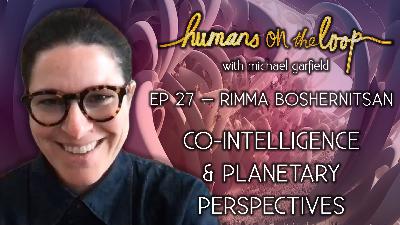
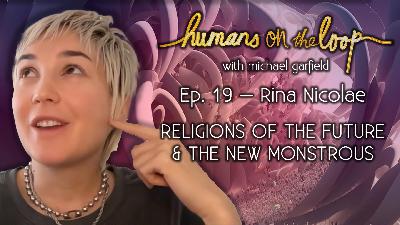
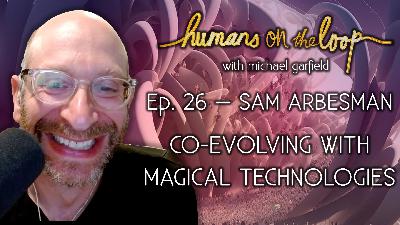
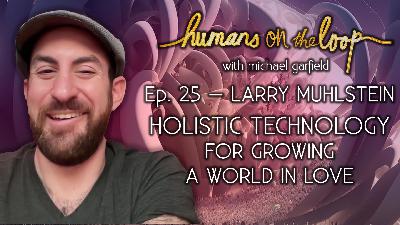
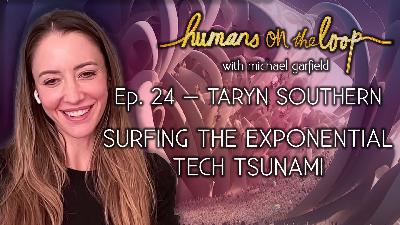
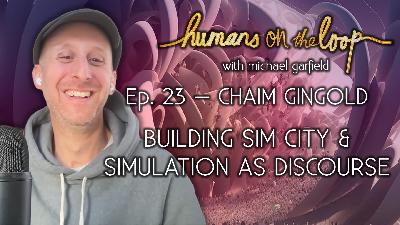
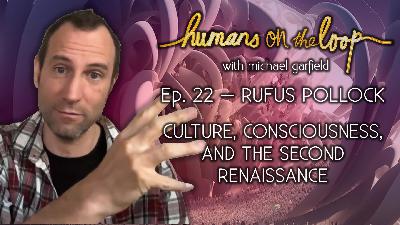
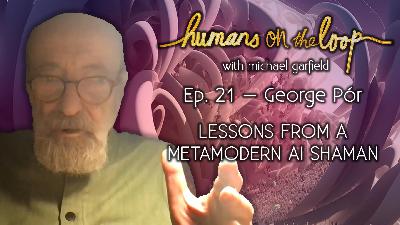

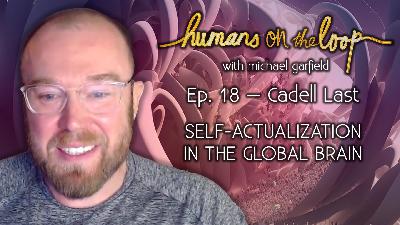
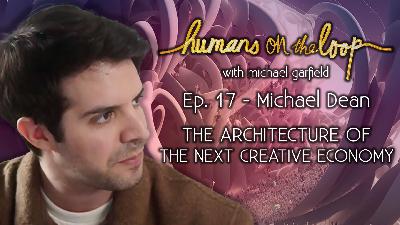




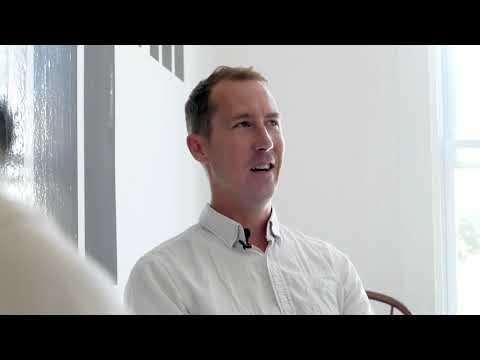







We've been asking these questions for more than 4000 years BECAUSE they are unanswerable. They provide a framework for discussion, and to claim you have answers because you snorted some DMT off the back of an old iPhone one time is just peak arrogance. Well articulated bullshit is still bullshit.
Im far to stupid to follow most of this podcast, but I recognize its beauty, and I recognize its importance, and I'll keep trying. Thank you for your positive contribution to humanity's sum total.
A truly thought provoking podcast. Look at humanity, consciousness, language through the great expanse of time. Time doesn't pass- it accumulates. ...so what is our impact on this dirty snowball?